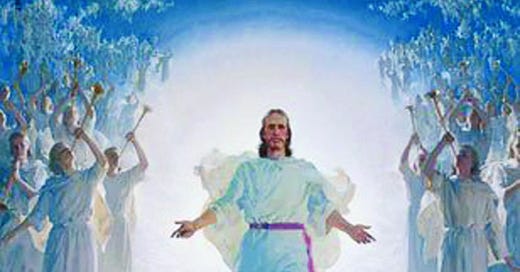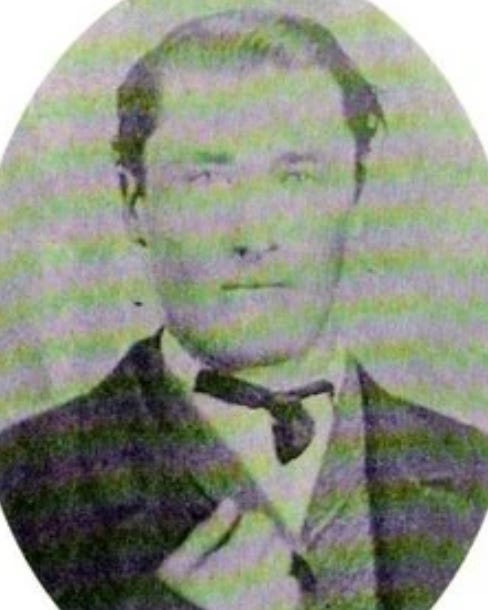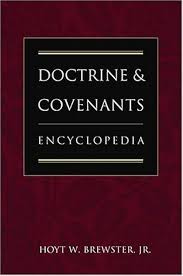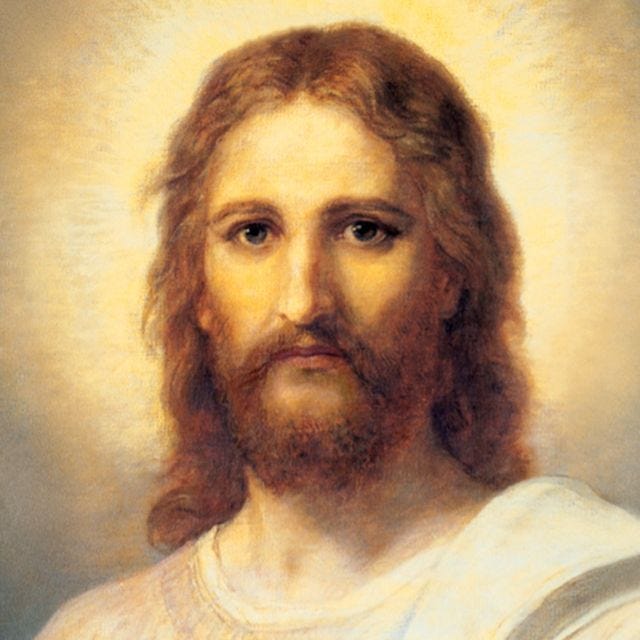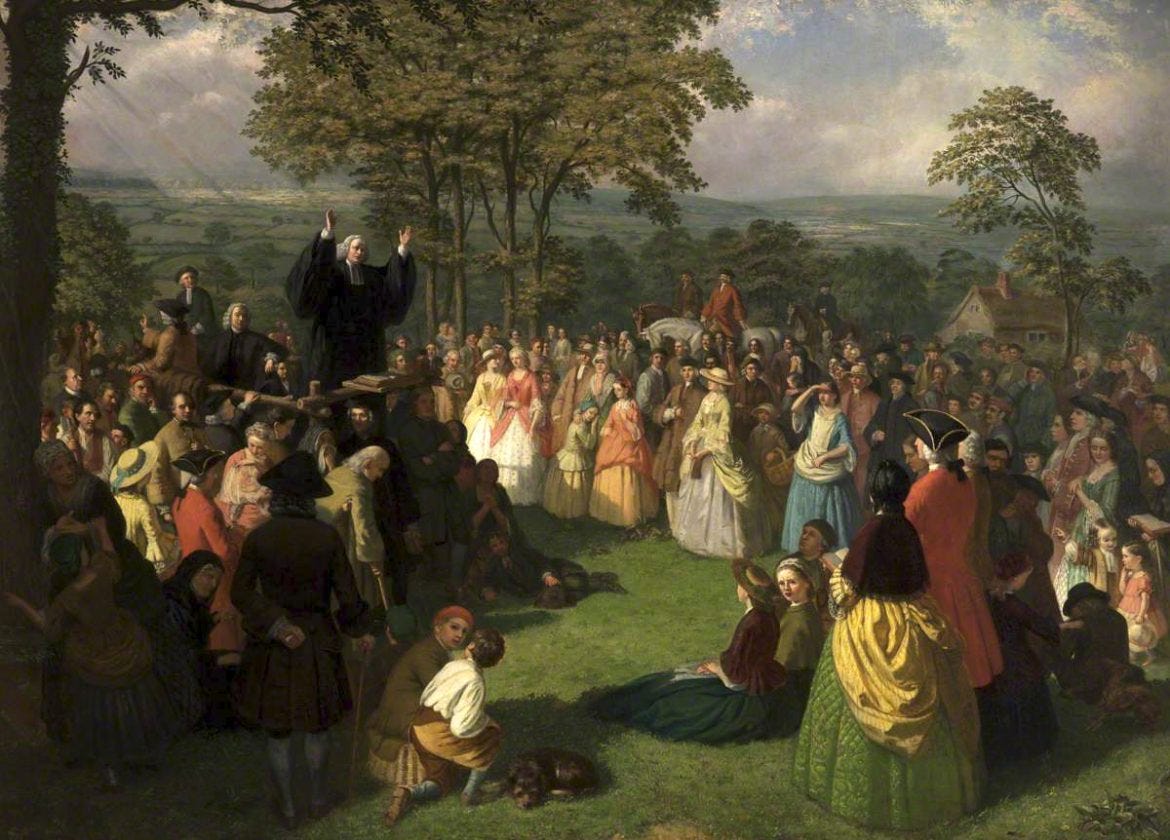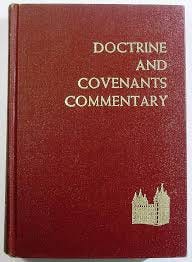Be Ready at the Coming of the Bridegroom
Historical Background and Reflections on Doctrine and Covenants 33
In his book The Revelations of the Prophet Joseph Smith, Lyndon W. Cook describes the background for Doctrine and Covenants section 33:
Date. October 1830.
Place. Fayette, Seneca County, New York.
Historical Note. Section 33 is a revelation to Ezra Thayer and Northrop Sweet, both of New York. Through Joseph Smith they had sought the will of the Lord concerning them.
Publication Note. Section 33 was first published as chapter 35 in the Book of Commandments in 1833. (p. 47)
The Biographical Notes in Cook’s book are helpful, but we’ll begin with these brief biographical notes from the LDS.org website:
Ezra Thayer (see also here)
(1791–1862)
Ezra Thayer was born in New York. Sometime before 1820, he married Elizabeth Frank. In the fall of 1830, Thayer was baptized into The Church of Jesus Christ of Latter-day Saints. In October of that year, Thayer was called to serve a mission (Doctrine and Covenants 33). In June 1831, while living in Kirtland, Ohio, he was ordained a high priest and called to serve a mission to Missouri (Doctrine and Covenants 52:22). That same month, he was admonished in a revelation to forsake his pride and selfishness (Doctrine and Covenants 56:8). Back in Kirtland, Thayer participated in the School of the Prophets in January 1833, and the following year, he marched from Ohio to Missouri as part of the Camp of Israel. In May 1835, his Church membership was suspended for an indeterminate amount of time. He served on the high council at Adam-ondi-Ahman, Missouri, in June 1838. After briefly affiliating with James J. Strang’s movement at Voree, Wisconsin, in the early 1850s, Thayer was rebaptized into the Church in New York in September 1854. Six years later, he joined the Reorganized Church of Jesus Christ of Latter Day Saints in Galien, Michigan.
References in the Doctrine and Covenants
Doctrine and Covenants 33, 52, 56, 75
Additional Information
Biographical facts and sources, The Joseph Smith Papers
Revelations In Context
Of his conversion to the Restored Gospel of Jesus Christ, Ezra Thayer wrote:
When Hyrum began to speak, every word touched me to the inmost soul. I thought every word was pointed to me. God punished me and riveted me to the spot. I could not help myself. The tears rolled down my cheeks, I was very proud and stubborn. There were many there who knew me, I dare not look up. I sat until I recovered myself before I dare look up. They sung some hymns and that filled me with the Spirit. When Hyrum got through, he picked up a book and said, “here is the Book of Mormon.” I said, let me see it. I then opened the book, and I received a shock with such exquisite joy that no pen can write and no tongue can express. I shut the book and said, what is the price of it? “Fourteen shillings,” was the reply. I said, I’ll take the book. I opened it again, and I felt a double portion of the Spirit, that i did not know whether I was in the world or not. I felt as though I was truly in heaven.
Martin Harris rushed to me to tell me that the book was true. I told him that he need not tell me that, for I knew that it is true as well as he. (The Revelations of the Prophet Joseph Smith, pp. 47-48)
In the LDS Come Follow Me manual, we learn more about Ezra Thayer:
Ezra Thayer wrote that sometime before he was baptized, he had a vision in which “a man came and brought me a roll of paper and presented it to me, and also a trumpet and told me to [play] it. I told him that I never [played] any in my life. He said you can [play] it, try it. … It made the most beautiful sound that I ever heard” (“Revelation, October 1830–B, Revelation Book 1,” historical introduction, josephsmithpapers.org). When Joseph Smith later received a revelation for Ezra Thayer and Northrop Sweet, now recorded as Doctrine and Covenants 33, Ezra interpreted the revelation as the roll of paper in his vision.
The story of Ezra Thayer’s progress from skeptic to believer is yet another witness to the truth of the Book of Mormon and the Divine origins of Joseph Smith’s prophetic calling. At first Ezra was hostile to the news of the Book of Mormon and Joseph Smith’s preaching, but he received such a powerful witness of the truth of the Restored Gospel of Jesus Christ that he repented of his pride and stubbornness and became a great missionary for the Church of Jesus Christ.
After the death of Joseph Smith in June 1844, Thayre was part of the minority of Latter Day Saints who refused to follow the leadership of Brigham Young and the Quorum of the Twelve. When the majority of Saints departed Nauvoo for the Salt Lake Valley, Thayer remained behind in Nauvoo. In 1849, Thayre moved to Michigan. Affiliated briefly with James J. Strang at Voree, Walworth Co., Wisconsin,[8] but soon returned to New York where he was rebaptized into the LDS Church in September 1854.[9] He became a member of the Reorganized Church of Jesus Christ of Latter Day Saints in at Galien, Berrien Co., Michigan on August 24, 1860.[9](from Wikipedia)
In Hoyt W. Brewster Jr.’s Doctrine & Covenants Encyclopedia, this is the entry on Thayre, Ezra:
The name of Ezra Thayre appears in several revelations (D&C 33:1; 52:22; 54:preface; 56:5, 8; 75:31). In three of these he is admonished to take up the labors of missionary work, and in one he is rebuked for his pride and selfishness. There is also mention of his membership being in question in 1835, based upon a complaint signed by another Elder (HC 2:221). Thayre himself had previously brought charges against another member because his method of preaching was thought to be unbecoming (HC 2:33).
His later service included being a member of Zion’s Camp (HC 2:185), a member of the First Quorum of the Seventy (SS, 307), and a high councilor at Adam-ondi-Ahman (HC 3:39). He became a member of the political governing body known as the Council of Fifty and campaigned in behalf of Joseph Smith’s presidential bid in 1844.
Thayre did not remain faithful to the Church following the martyrdom of the Prophet and later affiliated with the Reorganized Church. (BYUS 20:163-97.)
See also: Thompson, Ohio (pp. 588-589)
Enough about Ezra Thayer. What about Northrop Sweet?
Northrop Sweet (see also here)
(1802–81)
Northrop Sweet was born in New York. Sometime before June 1830, he and his wife, Elethan Harris, moved to Palmyra, New York. In October of that year, Sweet joined The Church of Jesus Christ of Latter-day Saints and was called to serve a mission (Doctrine and Covenants 33). Sometime before June 1831, he moved to Kirtland, Ohio, where he was ordained an elder. However, he soon left the Church for unknown reasons.
References in the Doctrine and Covenants
Additional Information
Biographical facts and sources, The Joseph Smith Papers
Revelations In Context
In Hoyt W. Brewster Jr.’s Doctrine & Covenants Encyclopedia, this is the entry on Sweet, Northrop:
The full name of Northrop Sweet does not appear in the context of a revelation, for he is merely referred to as “my servant Northrop” (D&C 33:1). His full name now appears in the preface to that revelation. Of him, Joseph Fielding Smith has written: “Northrop Sweet came in the Church at the time of the preaching of the Lamanite missionaries. On October, 1830 [he was] called by revelation to enter the ministry and hearken to the voice of the Lord…. It was not long after this that Northrop Sweet left the Church and, with some others, formed what they called ‘The Pure Church of Christ,’ and organization that soon came to its end.” (CHMR 1:152.)
In the LDS Come Follow Me manual we learn more about the background for D&C 33:
Doctrine and Covenants 33 was addressed to Northrop Sweet and Ezra Thayer, two new members of the Church. Northrop left the Church soon after this revelation was given. Ezra served faithfully for some time, but he also eventually fell away. Reading about them in this section might prompt you to consider how firmly you are built “upon [the] rock” (verse 13) of the gospel. What truths in these verses can help you remain faithful to the Savior? See also Helaman 5:12.
The Prophet Joseph Smith introduced this revelation as follows:
The Lord, who is ever ready to instruct such as diligently seek in faith, gave the following revelation at Fayette, New York:
Behold, I say unto you, my servants Ezra and Northrop, open ye your ears and hearken to the voice of the Lord your God, whose word is quick and powerful, sharper than a two-edged sword, to the dividing asunder of the joints and marrow, soul and spirit; and is a discerner of the thoughts and intents of the heart.
For verily, verily, I say unto you that ye are called to lift up your voices as with the sound of a trump, to declare my gospel unto a crooked and perverse generation.
For behold, the field is white already to harvest; and it is the eleventh hour, and the last time that I shall call laborers into my vineyard.
And my vineyard has become corrupted every whit; and there is none which doeth good save it be a few; and they err in many instances because of priestcrafts, all having corrupt minds.
And verily, verily, I say unto you, that this church have I established and called forth out of the wilderness.
And even so will I gather mine elect from the four quarters of the earth, even as many as will believe in me, and hearken unto my voice.
Yea, verily, verily, I say unto you, that the field is white already to harvest; wherefore, thrust in your sickles, and reap with all your might, mind, and strength.
Open your mouths and they shall be filled, and you shall become even as Nephi of old, who journeyed from Jerusalem in the wilderness.
Yea, open your mouths and spare not, and you shall be laden with sheaves upon your backs, for lo, I am with you. (D&C 33:1-9)
I love the Lord’s description of His word. What are the characteristics of the word of the Lord? It is:
Quick
Powerful
Sharper than a two-edged sword to the dividing asunder of the joints and marrow, soul and spirit
A discerner of the thoughts and intents of the heart
This revelation is not very flattering to the people to whom the Lord called Ezra Thayer and Northrop Sweet to preach His Gospel. The Lord describes their generation as “crooked and perverse.” Certainly this description includes our present generation as well. This is the good old fashioned fire and brimstone preaching that I miss from the olden days or the days of the early Restored Church. The Lord tells it like it is because He loves us and wants to save us. If we were righteous and upright, the Lord would tell us, but the Lord called these missionaries to declare His Gospel unto a crooked and perverse generation.
Furthermore, the Lord indicated that the time of His Second Coming was rapidly approaching, with a white field, ready for the harvest, in the last time for the laborers in His vineyard, the eleventh hour. If it was already the eleventh hour in 1830, in the Lord’s time, it must be at least 11:30 am now, if not 11:45 am or 11:50 am. Sometimes it really seems like it is at least 11:55 am out there in the world, if not 11:59 am. Whatever the case, the great day of the Lord and His Second Coming draws nigh.
The Lord’s less than flattering description of this generation (which certainly includes us today) continues when He describes His vineyard as completely (every whit) corrupt. The Lord’s rebuke of this crooked and perverse generation and His corrupt vineyard, a world in which, with rare exception, none does good, reminds me very much of Mormon’s and his son Moroni’s description of the conditions of the world in the last days. In their jeremiads against the wicked latter-day Gentiles, or in other words us, Mormon and Moroni specified that if anyone did any good, such good would only be accomplished through the gifts of the Spirit.
…For there shall be anone that doeth good among you, no not one. For if there be one among you that doeth good, he shall work by the power and gifts of God. (Moroni 10:24-25)
The Lord even went so far as to warn that even the very few who do good in many instances err because of priestcrafts (see here and here), all having corrupt minds. Can you imagine such fire and brimstone preaching from the pulpit today? Isn’t this what we truly need, good old-fashioned fire and brimstone preaching, and not the customary pleasing platitudes, flattery, and all is well in Zion rhetoric?
The Lord established His Church and called it forth out of the wilderness for a purpose, a purpose that includes gathering His elect - or those who will believe in Him and hearken to His voice - from the four quarters of the earth. He promised to be with Ezra Thayer and Northrop Sweet, to make them like Nephi of old, and to reward them with with sheaves upon their backs, if they would just open their mouths and let the Lord fill them.
Let’s see what Smith and Sjodahl contribute to our study in their commentary:
In this Revelation the Lord calls Ezra Thayre and Northrop Sweet to missionary labors. It contains (1) a description of the condition in which the world is, and urges them to god to work (2-9); (2) states what they should preach (10-12); (3) give special instructions relating to the ministry (13-18).
Open ye your ears and hearken] Only he whose ears are open to hear the voice of the God and who is willing to obey, is qualified to be a messenger of the Almighty. God’s ambassadors must be in touch with Him and know His will at all times.
Quick and powerful] See Sec. 6:2
Soul and spirit] The union of the spirit and the body is the soul (Sec. 88:15), and, if that definition is the only one, the expression is somewhat difficult to analyze. But “soul” also means “life,” and this seems to be the meaning here.
Perverse generation] Our Lord employed this expression, when He came down from the Mountain of Transfiguration and saw how weak in faith were His disciples, how great power the demons had over a human being, and how senseless were the disputations of the scribes and Pharisees in view of the actual condition of the people.
It is the eleventh hour] This expression is from Matt. 20:6. Our Lord had taught the Twleve that it was almost impossible for a rich man to enter the Kingdom of HEaven. Then the disciples said, in substance, “We, at any rate, left all and followed Thee; what shall our reward be?” Christ’s answer was the parable of the Laborers in the Vineyard, in which He taught them that all His servants should have a great reward, but that those who are called last will receive just as much as the first. The time in which we live is the eleventh hour, and those who obey the call now will receive just as much as the laborers of former dispensations. The reward which God gives is not on the same basis as that which obtains in the world of industry among men. It is, after all, a gift. “The wages of sin is death; but the gift of God is eternal life through Jesus Christ our Lord” (Rom. 6:23) “The wage at best is a free giftl for on the basis of strict accounting who of us is not in debt to God?” (Dr. James E. Talmage, Jesus the Christ, p. 482).
Corrupted every whit] “Whit” means a very small part of a thing, a particle, and when the Lord says that His vineyard has become corrupted, “every whit,” He teaches us that the corruption is total: that there is not a spot in all the world that has not been affected by the apostasy from His sovereignty. Hence the urgent necessity of faithful laborers at this, the eleventh and last hour.
Many object to the teachings of the gospel on the subject of the deviation from the original pattern. They take exception to the picture of total corruption presented but this only confirms the truth of the gospel. We have in holy writ successive portraits of human nature taken at various times. One was taken before the deluge: “All flesh had corrupted his way upon the earth” (Gen. 6:12). Another is presented by Eliphaz, in Job: “Man, which drinketh iniquity like water” (Job 15:16). David viewed the conditions in this light: ‘The Lord looked down from heaven upon the children of men, to see if there were any that did understand, and seek God. They are all gone aside; they are all together become filthy; there is none that doeth good, no, not one” (Psalm 14:2, 3). Paul, in his day, repeats this and draws a terrible picture of man outside the influence of the gospel (Rom. 3:10-18). “There is,” he says, “no fear of God before their eyes.” The picture presented in the Revelations given in our day has the same features. “They [the sects] were all wrong.” “My vineyard has been corrupted, every whit.” Let the reader compare these statements with those quoted from the Bible, and he will feel convinced that they originated in the same source - the Foundation of truth. The purpose of God in presenting these pictures is to call men to repentance. Even those who are doing good, according to the best of their understanding, err in many respects because of “priestcraft.”
6. Mine elect] The “elect” are those who “will believe in me, and hearken unto my voice.” The Lord regards the “will,” the “desire” of man. Many are prevented from believing and obeying the gospel, by ignorance or prejudices. But they are honest, even in their mistakes and errors. Such will eventually be brought to a knowledge of the truth. All who will believe and obey are the “elect.”
7. The field is white already to harvest] When our Lord uttered these memorable words to His first disciples (John 4:35), He was sitting at the famous well, near Sychar (the modern Nablus). He had had a “gospel conversation” with a Samaritan woman, and she had gone into the City and told the people of that wonderful conversation. The people were hastening to the well. It was at this moment that our Lord noticed the Samaritans coming over the fields, and called the attention of the disciples to the approaching multitude: “Lift up your eyes and look on the fields; for they are white already to harvest.” Christ saw in the flocking of these Samaritans to him the beginning of an abundant harvest of souls. So there was, in the first conversions, in our dispensation, an assurance of an abundant harvest. There was no reason to hesitate to go to work.
8. As Nephi of old] This is a promise that if they would “open their mouths,” that is, consecrate their gift of speech to the service of the Lord, He would accept them and make them as Nephi of old, who as a leader of men, because of his faith and obedience. The promise is repeated in verse 9. (pp. 172-74)
The Lord’s revelation to Ezra Thayer and Northop Sweet continues:
Yea, open your mouths and they shall be filled, saying: Repent, repent, and prepare ye the way of the Lord, and make his paths straight; for the kingdom of heaven is at hand;
Yea, repent and be baptized, every one of you, for a remission of your sins; yea, be baptized even by water, and then cometh the baptism of fire and of the Holy Ghost.
Behold, verily, verily, I say unto you, this is my gospel; and remember that they shall have faith in me or they can in nowise be saved; (D&C 33:10-12)
This is the Gospel of Jesus Christ in a nutshell. This is the simple message that these two missionaries (Thayer and Sweet) were sent forth to declare, and it is the simple message that the Lord’s servants continue to declare today.
This is the Smith and Sjodahl commentary on these verses:
10-12. The servants of the Lord are here instructed what to preach to the world. This is their message:
(1) Repent] This is the alpha and omega of their mission (see Sec. 3:20; 6:9; 11:9; 15:6, etc.).
(2) Prepare the way of the Lord] Eastern potentates, when traveling from one part of the kingdom to another, would proclaim their coming and order their subjects to prepare the way for them, by building roads where there were none, if necessary; by leveling hills and filling depressions, and straightening out the winding paths. Semiramis is said to have had roads constructed especially for her journeys. In modern times the Turkish government bulit a good road from Jaffa to Jerusalem, when the German Emperor signified his intention of visiting the Holy City. To prepare the way of the Lord and make His paths straight is to acknowledge His sovereignty and to make all necessary preparations for His reception. He will not come to reign until all necessary preparations for his coming have been made. “Hear this, O Earth! The Lord will not come to reign over the righteous, in this world, in 1843 [as was expected by Miller] nor until everything for the Bridegroom is ready” (Joseph Smith, History of the Church, Vol. V., p. 291).
(3) Be baptized] Baptism for the remission of sins is a necessary part of the preparation.
(4) Baptism “of fire and the Holy Ghost” is equally necessary. Baptism in water an in that fire which is “holy spirit” is but one baptism. Any ceremony which does not embrace both is empty and void.
(5) They shall have faith in me] Faith is also necessary, for without faith there is no salvation. “Faith comes by hearing the word of God, through the testimony of the servants of God” (Joseph Smith, History of the Church, Vol. III., p. 379).
These five subjects embrace the entire gospel. Repentance, acceptance of Christ as the Sovereign whose coming is near, baptism in water, reception of the Holy Ghost, and faith form the complete and perfect basis of true religion. (pp. 174-75)
The Lord’s revelation to Ezra Thayer and Northrop Sweet concludes:
And upon this rock I will build my church; yea, upon this rock ye are built, and if ye continue, the gates of hell shall not prevail against you.
And ye shall remember the church articles and covenants to keep them.
And whoso having faith you shall confirm in my church, by the laying on of the hands, and I will bestow the gift of the Holy Ghost upon them.
And the Book of Mormon and the holy scriptures are given of me for your instruction; and the power of my Spirit quickeneth all things.
Wherefore, be faithful, praying always, having your lamps trimmed and burning, and oil with you, that you may be ready at the coming of the Bridegroom—
For behold, verily, verily, I say unto you, that I come quickly. Even so. Amen. (D&C 33:13-18)


